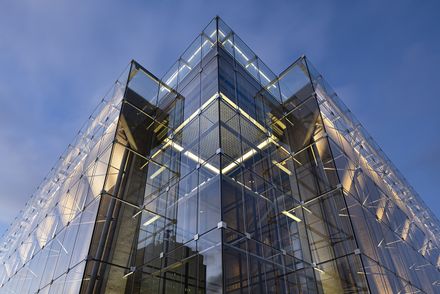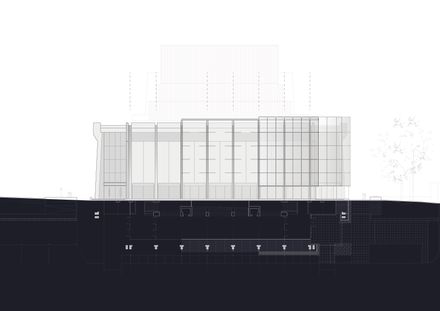ARCHITECTS
Lemay
LIGHTING DESIGNERS
Lemay & Atelier 21, Guy Simard And Lumenpulse
GLASS MANUFACTURER
Vitrerie Laberge
STEEL STRUCTURE
Métal-presto
CONSORTIUM
Lemay & Atelier 21
ENGINEERING
Wsp
GENERAL CONTRACTOR
Pomerleau
GLASS AND FIXTURE DESIGN ENGINEERING
Elema Experts-conseils
EXPERTS IN MATERIALS ENGINEERING
Simco
YEAR
2020
LOCATION
Quebec City, Canada
TYPE
Cultural › Hall/theater
Prized for its brutalist architecture by Victor Prus and historic mural by Jordi Bonet, the fragile Grand Théâtre de Québec, inaugurated in 1970, required a major intervention to restore and protect its outer shell.
Prefabricated concrete indoor and outdoor walls are the theatre’s defining feature; their anchors had disintegrated over time due to moisture seeping into the concrete. Nearly 60% of the interior is covered by the Bonet mural.
The concrete icon reflects the end of the Quiet Revolution in Quebec, and its mural is one of the largest in the world.
The fragility of the work and the inability to directly access the concrete anchors required a radical solution to protect this heritage treasure.
The start of the refurbishment project required consideration of its two defining components: the architecture of Prus and the monumental work of Bonet.
The proposed intervention was meant to be a holistic reflection based on an interpretation, a transposition of these entities into a work depicting finesse.
The opposing elements were intentional: the new outer shell fades, disappears, reflects, illuminates. It articulates the project discreetly and sensitively.
Beyond its primary function, the casing acts as an extension of the original building it now protects, using Prus’ finely developed structural logic and composition, married to the building’s unusual shape.
The glass can appear solid or immaterial depending on the light, sometimes blurring the boundaries of the building.
In turn, it protects the building from the weather mainly by creating a tempered envelope, while a low-flow heat recovery and thermal mass system provides an energy-efficient and economical solution.
The glass casing is amplified according to the morphology of the Grand théâtre; it twists at the corners, it lifts at the base, it fades, leaving the concrete work intact and perfectly visible.
It keeps the continuity of the design storyline developed by Prus, while the beautiful Octave-Crémazie Hall highlights the work of Bonet, enshrined by Prus’ protective outer shell now enhanced by a thin wall of immaterial and protective glass.
It has become the main interface with the City, true to its theatrical pedigree: a new act in the discovery of Quebec culture.

























